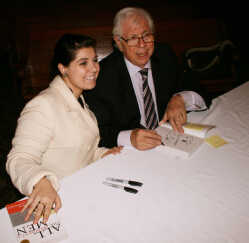Watergate journalist shares how 'detective story' unfolded

If you ever doubted the Watergate scandal unfolded in a different time, in a different America, in an era of void of virtually all the technology we take for granted today, all you need do is watch a few moments of the movie "All the President's Men."
The 1976 film, based on the 1974 bestseller by the same name, opens with the unmistakable staccato-like sound of a typewriter pounding out the date June 17, 1972.
That's the day a piece of masking tape, discovered on an office door lock, began unlocking a trail of deceit that ultimately brought down the most powerful political figure in the world, President Richard M. Nixon.
For the next 2-1/2 years journalists Carl Bernstein and Bob Woodward would pound out 400 Watergate stories for the Washington Post without benefit of computers, laptops, cell phones, Google or the Internet.
In short, this was your father's Oldsmobile. Pay phones, parking garages and paisley prints.
Wednesday evening as Bernstein visited DePauw University as the latest headliner in the Ubben Lecture Series, he took a moment to reflect on the film version of a story Hollywood posterized as "the most devastating detective story of the century."
So how true to form was the film version of Watergate saga?
"Very faithful," Bernstein said during a brief press conference in the bullpen at WGRE, the student-run DePauw radio station.
"It follows the book," he elaborated with a response that brought back memories of Deep Throat (actor Hal Holbrook playing an unknown informant later identified as Mark Felt, deputy director of the FBI) telling Woodward to "follow the money."
What Bernstein respects about the film -- and what probably wouldn't be the case today -- is that it focused on the pursuit of the story and not the pursuers.
"It's not about Woodward and I and our private lives," he praised. "It's all about the reporting and the way the institutions responded."

Granted, Woodward and Bernstein were portrayed by Hollywood royalty (Robert Redford and Dustin Hoffman), but Woodward would be the first to tell you he didn't exactly favor a mid-1970s Redford. Bernstein, on the other hand, bears somewhat of a resemblance to the quirky Hoffman. (Ken Owen, DPU executive director of media relations, took the opportunity to assure the 68-year-old Bernstein he's better looking than Hoffman).
Just as the movie version of the Watergate story builds momentum and unfolds like a crime drama, Woodward and Bernstein attacked it "as we were taught," Bernstein said.
"We went about covering it like a local police story," the Pulitzer Prize-winning reporter and author said Wednesday night, noting that in employing basic common sense, knocking on doors and enlisting simple methodology, "there was nothing glamorous about it."
Nothing except the end result as President Nixon resigned from office on Aug. 9, 1974.
Before that occurred, however, Woodward and Bernstein faced their share of hurdles, animosity and threats.
As they continued to report the story, the White House chose to take issue not with the conduct of the administration but the Washington Post, attacking the newspaper and its young reporting duo for "using hearsay and innuendo."
Bernstein recalled the moment he feared for his safety most after discovering the secret $700,000 fund that paid for the bugging of the Watergate office building and National Democrat Headquarters. The Post investigation showed it was presided over by U.S. Attorney General John Mitchell.
Pressing the White House for a comment on that development, all Woodward and Bernstein got was a repeated statement saying, "The sources of the Washington Post are a fountain of misinformation."
That's when Bernstein remembered he had a phone number for Mitchell in New York and called him to say there would be a story in the morning paper about his role in controlling that fund.
"Jesus!" was all Mitchell first responded.
As Bernstein expounded on the report, Mitchell replied with "Jesus Christ!" and swelled his responded to "Jesus Christ, all that crap, you're putting it in the Washington Post?"
Mitchell uttered a disparaging thing or two about Washington Post owner Katharine Graham, which made Bernstein jump back from the telephone fearing for his own physical safety.
"When the campaign is over," Mitchell threatened, "we're going to do a story about you two boys."
And then he hung up the phone on Bernstein.
"That's the most chilling moment I've ever experienced as a journalist," he told his DePauw audience. "The most powerful man in the Justice Department was making that threat, and he meant it."
It was about that time in the process that Executive Editor Ben Bradlee put his own fear of God into his young (Bernstein was 28, Woodward 29) reporters.
"Nothing much is riding on this," Bradlee told them in a scene depicted perfectly in the movie, "except maybe the First Amendment of The Constitution, freedom of the press and the future of the country.
"Not that any of that matters," he adds. "But if you guys (screw) up again, I'm going to get mad."
By hosting Bernstein on campus Wednesday, DePauw became one of few places both Woodward and Bernstein (in the proper order even) have both spoken.
In the years since Watergate, at least two more of the "President's Men," Jeb Stuart Magruder and Charles Colson, have spoken here.
And of course, Richard Nixon himself visited DePauw while vice president of the United States in May 1957.
